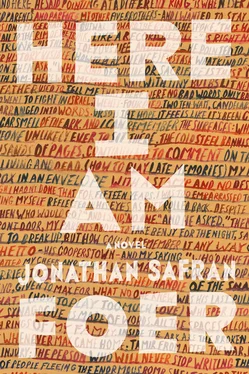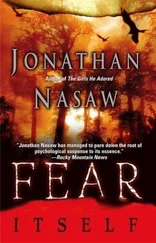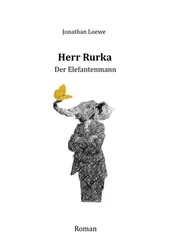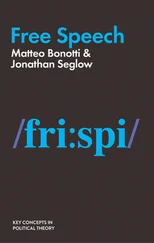“Try. Who are you?”
“OK, never mind. I’m sorry I came over here.”
“Who are you, Jacob?”
“Who are you , Tamir?”
“I am someone who goes home, no matter how difficult.”
“Well then, you took the words out of my mouth.”
“Maybe. But not out of your heart. Wherever you go, you won’t be going home.”
When my mother first got sick, she mentioned that my father visited Isaac’s grave once a month. When I asked him about it, he deflected, as if I’d confronted him about a gambling addiction.
“Penance for burying him in America,” he said.
“What do you do there?”
“Just stand around like a jerk.”
“Can I go with you next time?” I asked my father; I told Tamir, “Stay.”
“Then who would go?” Tamir asked.
“No one.”
“Then what would save it?”
“Nothing.”
“Just let it go?”
“Yes.”
I was right: my father cleaned the site of twigs, leaves, and weeds; he wiped down the gravestone with a wet rag he’d brought in a ziplock in his jacket pocket; and from another ziplock he removed photos.
“The boys,” he said, turning them toward me for a moment and then laying them on the ground, facedown, above his father’s eyes.
I’d wanted to make an eruv around the suicides and carry the shame away from them, but how would I bear my own shame? How, coming home from Islip, would I face Julia and the boys?
“It feels like we were burying him five minutes ago,” I said to my father; I said to Tamir, “It feels like we were picking you up at the airport five minutes ago.”
My father said, “It feels like everything was five minutes ago.”
Tamir brought his lips to my ear and whispered, “You are innocent.”
“What?” I whispered, as if I were looking at stars.
“You are innocent.”
“Thank you.”
He pulled back and said, “No, like, too trusting. Too childlike.”
“What, gullible ?”
“I don’t know that word.”
“What are you trying to say?”
“Of course Steven Spielberg wasn’t in the men’s room.”
“You made up that whole thing?”
“I did.”
“You knew who he was?”
“You think we don’t have electricity in Israel?”
“You’re very good,” I said.
“I see you,” my grandfather would say from the other side of the glass.
“You’re very innocent,” Tamir said.
“See you,” my grandfather would say.
“And yet we’ve never been older,” my father said, and then chanted the Mourner’s Kaddish.
HOW TO PLAY THE LAST THING ONE SEES BEFORE COMMITTING SUICIDE
Six closed eyes, three genuine smiles.
HOW TO PLAY THE LAST THING ONE SEES BEFORE BEING REINCARNATED
The EMERGENCY exit from MacArthur Airport’s terminal; the EMERGENCY entrance to the world.
HOW TO PLAY SUICIDE
Unbuckle your belt. Slide it back out the five loops of your pants. Wrap it around your throat and tighten, buckle on the back of your neck. Place the other end of the belt over the door. Close the door, so that the belt is held firmly in place between the top of the door and the doorframe. Look at the refrigerator. Allow full body weight to fall. Eight closed eyes.
HOW TO PLAY REINCARNATION
A few months after moving out, on yet another day without a letter in the mailbox on my bedroom door, I was emptying the kids’ hampers and found a poop in a pair of Max’s underwear. He was eleven. I got several such dispatches in the coming weeks. Sometimes I was able to turn the underwear inside out over the toilet, scrub at any stain that was left, and throw them into the wash. Usually they weren’t salvageable.
I didn’t mention it to Dr. Silvers, for the same reason I didn’t mention my persistent throat pain to my actual doctor: I suspected it was a symptom of something that I didn’t want revealed. I didn’t mention it to Julia, because I didn’t want to hear that Max never did it at her house. And I didn’t mention it to Max, because that was something I could spare him. Spare us.
As a child, I used to leave bowel movements on the lilac carpet of my grandfather’s bathroom, a few inches from the toilet seat. It was on purpose. Why did I do such a thing? Why did Max?
I desperately wanted a dog, as a boy, but was told they were dirty. As a boy, I was told to wash my hands before going to the bathroom, because the world was dirty. But I was also told to wash my hands after.
My grandfather mentioned the poops on his floor only once. He smiled, covered the side of my head with his enormous hand, and said, “It’s OK. It’s great.” Why would he say such a thing?
Max never mentioned the poops in his hamper, although he came upon me hanging a pair of his hand-washed underwear on the drying rack and said, “Argus died the day we started coming to this house. Do you think this ever would have felt like home to him?”
HOW TO PLAY MATTERS OF DEATH AND REBIRTH
Never speak about them.
HOW TO PLAY BELIEF
At Julia’s second sonogram, we saw Sam’s arms and legs. (Although he wasn’t “Sam” yet, but “the peanut.”) So began the exodus from idea to thing. What you think about all the time, but can’t — without aids — see, hear, smell, taste, or touch has to be believed in. Only a few weeks later, when Julia was able to feel the peanut’s presence and movements, it no longer only needed to be believed in, because it could also be known . As the months progressed — it turned, kicked, hiccupped — we knew more and more and had to believe less. And then Sam came, and belief fell away — it wasn’t necessary anymore.
But it didn’t fall away completely. There was some residue. And the inexplicable, unreasonable, illogical emotions and behavior of parents can be explained, or partially explained, by having had to believe for the better part of a year. Parents don’t have the luxury of being reasonable, not any more than a religious person does. What can make religious people and parents so utterly insufferable is also what makes religion and parenthood so utterly beautiful: the all-or-nothing wager. The faith.
I watched Sam being born through the viewfinder of a video camera. When the doctor handed him to me, I put the camera on the bed and forgot about it until the nurse came to take him for measuring, or warming, or whatever utterly necessary thing they do with newborns that justifies the teaching of that most important life lesson: everyone, even your parents, will let you go.
But we had twenty minutes with him, so we have a twenty-minute video of the view of the dark window, with the soundtrack of new life — Sam’s new life, ours. I told Sam how beautiful he was. I told Julia how beautiful Sam was. I told her how beautiful she was. All of it was understatement, all of it imprecise — I used that same inadequate word to try to convey three entirely different, essential meanings: beautiful, beautiful, beautiful .
You can hear crying — everyone’s.
You can hear laughter — Julia’s and mine.
You can hear Julia calling me “Dad” for the first time. You can hear me whispering blessings to Sam, prayers: be healthy, be happy, know peace . I said it over and over— be healthy, be happy, know peace . It wasn’t the kind of thing I would say, and I hadn’t intended to say it; the words were drawn from some well far deeper than my life, and the hands raising the bucket weren’t my own. The last thing you can hear on the video, as the nurse taps on the door, is me saying to Julia, “Before we know it, he’ll be burying us.”
“Jacob…”
“OK, so we’ll be at his wedding.”
“Jacob!”
“His bar mitzvah?”
“Can’t we ease into it?”
Читать дальше












